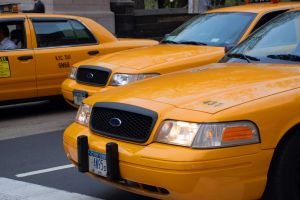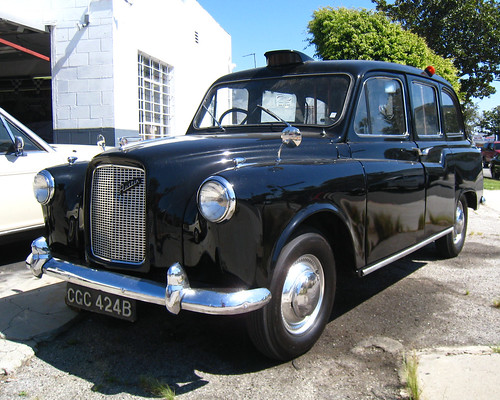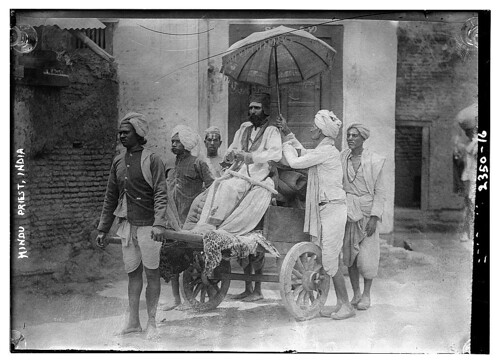[Photo: stock.xchng]
Taxi, cab, black cab, yellow cab, gypsy cab, hack – how many different words are there for that vehicle for hire? We decided to find out.
On this day in 1897, London became the first city to host licensed taxicabs. But vehicles for hire were around long before that.
The word hackney, referring to “a coach or other carriage kept for hire,” came about around 1664, according to the Oxford English Dictionary (OED), but originally referred to a place “now well within London, it once was pastoral and horses apparently were kept there.” Eventually, the word came to refer to “a horse kept for riding or driving,” as opposed to a war horse, and then “a horse kept for hire.”
From the “ordinary horse” sense came other meanings: “a person accustomed to drudgery” (1546), and “a prostitute” (1579). It’s also where we get hack, “a drudge; one who is overworked; especially, a literary drudge; a person hired to write according to direction or demand.”
The word cab is newer than hackney, originating around 1826 as a shortened form of cabriolet, “a covered one-horse carriage with two wheels.” Cabriolet comes from the Italian capriolare, “jump in the air,” so-named for the vehicle’s “light, leaping motion.”
A black-and-tan was “a cab of the coupé type, introduced in New York in 1883,” and named for its colors. An 1885 New York Times article reported that “‘black and tan’ cab No. 257 was going slowly down Broadway when a snort of steam from an elevated train at Thirty-third-street startled the horse and sent him on a gallop down that street.”
Livery cab is chiefly a U.S. expression, says the OED, attested to 1896. However, the word livery is much older, originating in the 14th century, according to the Online Etymology Dictionary, as “an allowance of food or other provisions statedly given out; a ration, as to a family, to servants, to horses, etc.,” and coming from the Old French livrer, “to dispense, deliver, hand over.” Livery car came later, in 1906, at the time that motorized taxicabs were introduced in New York.
[Photo: CC BY-NC-SA 2.0 by stevelyon]
Black cab, how the taxicab is commonly referred to in British English, is first attested to 1914, says the OED, but didn’t seem to gain popularity until the 1970s. Gypsy cab, “a taxicab that is licensed only to respond to calls but often cruises the streets for passengers,” attests to 1964.
The word taxi, short for taxicab, came up around 1907. Taxicabs were first known as taximeter cabs, where taximeter was “a commercial name of an instrument for automatically recording and mechanically computing the tax or charge to be made for the use of a hired vehicle in accordance with a determined tariff for such charges.” Taximeter comes from the Middle Latin taxa, “tax, charge,” and the Greek metron, “measure.”
In the early half of the 20th century, taxi was a colloquial term for “a (small) passenger aeroplane,” says the OED, which gave us the verb sense of taxi, “to move slowly on the ground or on the surface of the water before takeoff or after landing.”
Taxi is also U.S. slang for “a prison sentence of between five and fifteen years,” says the OED, perhaps from the analogy between a short taxi ride and relatively short prison term. Taxi dancer, “a woman employed, as by a dance hall or nightclub, to dance with the patrons for a fee,” is recorded from 1930 and comes from “the fact that the dancers are hired, like taxis, for a short period of time.”
Taxi squad is an American football term meaning either “a group of professional players who are under contract to and practice with a team but are ineligible to play in official games,” or “the four extra players on the roster of a professional team who are prepared to join the team on short notice, as to substitute for injured players.” The term is from 1966, says the Online Etymology Dictionary, possibly “from a former Cleveland Browns owner who gave his reserves jobs with his taxicab company to keep them paid and available,” or else from the idea of “short-term hire or shuttling back and forth from the main team.”
[Photo: No known copyright restrictions by Library of Congress]
Rickshaw, a sort of human-powered taxi, dates to 1887 and is an alteration of jinrikisha, which comes from the Japanese jin, “a man,” plus riki, “power,” plus sha, “carriage.” The word was popularized by Rudyard Kipling.
A pedicab is similar, except the passenger is drawn by rider on a tricycle. An autorickshaw, as its name implies, is a rickshaw with a motor. The tuk-tuk is a motorized rickshaw of Thailand, India, and other countries. The word is Thai in origin and named for the sound of the motor. The boda-boda in East Africa is “a bicycle or motorcycle used as a taxi.”
For even more on the history of the taxicab, check out this timeline from PBS, this photo series of New York City taxis, and this roundup of taxi related links from around the web.



According to the story I heard, we owe taxi indirectly to the Academie Francaise. The owners of cabriolets taxe a metre (pay according to the meter) applied to the AF to use the word taxametre officially. However, they decided on the classicizing spelling taximetre, which has since spread to all languages in the form taxi.
“Jitney” cab is word I heard growing up in a US midwest industrial city. It means illegal or unlicensed taxi, and is probably derived from Gypsy cab. It was often the only kind of cab available in African-American neighborhoods, where legal cabs often refused to go.